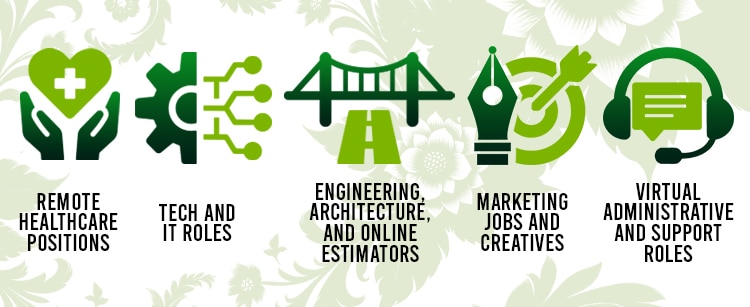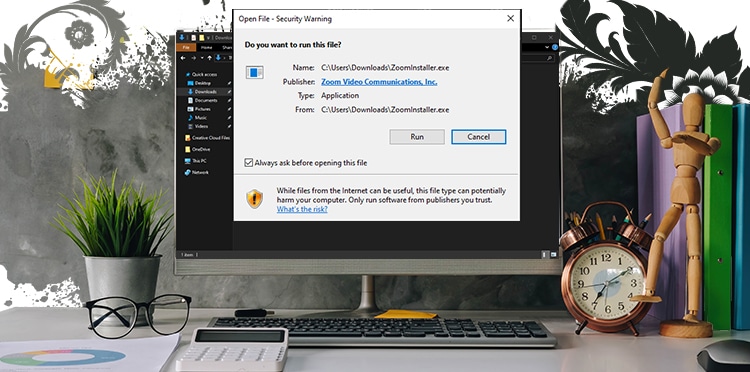Work from home jobs have forever changed work as we know it.
Thanks to advances in modern technology, several jobs we thought could only be done onsite can now be done at home.
That said, the rise of Artificial Intelligence (AI) threatens to render many entry-level jobs obsolete in the near future.
So, what can you do if you want to make the transition to an online work from home setup?
Here are the top industries predicted to offer in-demand remote jobs in 2025 – and how you can land them.

The Philippines: A Remote Work Hub in 2025
The Philippines is expected to further solidify its status as one of the premier outsourcing destinations in 2025.
Here’s why:
The Growing Demand for Remote Work in the Philippines Due to Global Outsourcing Needs
Thanks to its reputation as a global outsourcing hub, more and more Western companies are turning to the Philippines for skilled professionals in digital marketing, customer service, and Information Technology (IT) roles.
Within the Philippines, many Filipinos continue to look for online jobs, after experiencing its benefits firsthand during the pandemic.
Advantages Filipino Professionals Offer: English Proficiency, Cultural Adaptability, and Competitive Skill Sets
A main driving force for this demand is the Filipinos’ English proficiency and familiarity with Western culture.
This makes communication that much easier and helps minimize friction.
Additionally, the Philippines also boasts a vast pool of trained professionals in various industries.
This, alongside our digital skills and strong work ethic, means that Filipinos generally excel at working online.
Filipino workers are proficient in areas like IT, graphic design, and virtual administrative roles.
Additionally, their familiarity with virtual communication apps, project management software, and other remote work tools ensures seamless integration into remote teams.
Finally, Filipino remote workers continuously upskill themselves through online courses and certifications to remain competitive.
How Remote Work Culture is Reshaping Career Opportunities Across Industries
Remote work’s increasing prevalence means that location is no longer an issue when it comes to some of the best jobs available.
This is especially beneficial for people like single mothers, Persons with Disabilities (PWDs), and those living in rural areas.
Additionally, remote work has created a demand for diverse roles in top industries like IT, healthcare, and education.

Top Remote Jobs to Watch Out for in 2025
Without further ado, here are the top industries where remote jobs are likely to be in high demand in 2025:
Tech and IT Roles
The tech and IT industry shows no signs of stopping in 2025, thanks to advances in AI and more companies transitioning to cloud-based infrastructures.
Software Developers, Data Engineers, and Cybersecurity Specialists in High Demand Globally
Software developers are responsible for creating and maintaining the applications companies need to digitize their operations and leverage AI.
Furthermore, companies rely increasingly on insights derived from data to improve their operations, which data engineers and scientists play a key role in.
Thus, the demand for roles like software developers, data engineers, and cybersecurity specialists is expected to increase next year.
The increasing digitalization of online retail and banking platforms also means that companies need robust cybersecurity measures -and talents well-versed in them – to protect their clients’ sensitive data.
Marketing Jobs and Creatives
The creative and marketing industries are set to get even stronger in 2025.
One major factor behind this is AI integration. AI helps creatives and marketing professionals focus on strategic innovation by streamlining routine processes for them.
Rising Opportunities for Content Writers, Video Editors, and Social Media Managers
As more and more companies transition online, they’ll need high-quality and engaging content to build their digital presence.
Thus, the demand for content writers and graphic designers will continue to rise.
With videos increasingly growing in popularity today, skilled video editors are likely to be in demand as well.
As more companies recognize the advantage of leveraging these platforms to reach their target audience, social media managers are likely to stay in demand.
Remote Healthcare Positions
Telehealth saw a surge in popularity during and after the pandemic.
The industry’s growth is driven by advances in telecommunication technology and the increasing prevalence of chronic conditions and cost-benefits of telehealth services.
As this industry continues to grow, several new remote healthcare positions could emerge for Filipinos with medical backgrounds who want to work online.
Growing Opportunities for Telehealth Assistants, Medical Coders, and Virtual Healthcare Advisors
Accurate coding plays a key role in telehealth services. This, in turn, has driven up the demand for specialized medical coders specializing in telemedicine-related procedures.
There’s also a growing need for skilled telehealth assistants adept at scheduling, patient support, and handling technical challenges during telehealth sessions – and for virtual healthcare advisors who can provide personalized healthcare guidance through remote communication channels.
Virtual Administrative and Support Roles
With the growing popularity of remote jobs, the virtual administrative support and outsourcing industries are expected to continue growing in 2025.
Besides access to a global talent pool, the cost efficiency in this arrangement is steadily driving its growth.
Increasing Demand for Virtual Assistants, Project Coordinators, and Customer Support Specialists
As more industries shift to a remote or hybrid setup, virtual assistants and project coordinators are essential for ensuring operational efficiency in these setups.
Furthermore, more companies are investing in skilled customer support specialists to meet increasingly exacting customer expectations.
This is especially apparent in the e-commerce and digital service industries, where virtual assistants handle social media, data entry, and scheduling while project coordinators oversee campaigns and customer support teams provide specialized service.
Engineering, Architecture, and Online Estimators
Although traditionally done on-site, the demand for online counterparts for these roles really took off during the pandemic, and shows no sign of stopping in 2025.
Its growth is driven by advances in technology and a shift towards sustainable, adaptive, and innovative design practices.
Online Engineers, Architects, and Estimators in High Demand Globally Today
Investments in modern architecture, green energy projects, and smart cities are driving the demand for architects and engineers skilled in sustainable and green architecture.
In addition, many companies are also shifting toward modular and prefabricated construction, which requires precise design and estimation expertise.
Another reason for the growing demand for these roles is the skill shortage in the engineering and architecture fields. Thus, many Western countries outsource these roles to highly skilled professionals in countries with lower labor costs.

Skills and Tools Every Filipino Remote Worker Needs in 2025
Planning to take advantage of the numerous remote job opportunities in 2025?
If so, here are the skills and tools you’ll need to land one of them next year:
Essential Tools: Zoom, Microsoft Teams, and Industry-Specific Software
Here are some of the must-have tools you’ll need for remote jobs in 2025:
1. Communication Tools:
- Zoom: One of the most popular virtual conferencing tools, Zoom features breakout rooms and screen sharing for remote brainstorming and collaboration.
- Microsoft Teams: Combines video meetings, chat, and file sharing in one platform while also seamlessly integrating with Microsoft Office 365 for productivity.
- Slack: A messaging platform ideal for quick updates and team channels, with integrations for project management and file sharing.
2. Project Management Tools:
- ClickUp: A versatile platform that combines task management, goal setting, and time tracking.
- Trello: A visual tool using boards and cards to manage tasks, ideal for small and medium projects.
- Asana: Offers task assignments, timelines, and progress tracking, suitable for complex workflows.
3. Cloud Storage and Collaboration Tools:
- Google Workspace: This includes Google Drive for file storage, and Docs/Sheets for real-time collaboration.
- OneDrive: Integrates with Microsoft Office Tools for seamless file storage and access.
- Dropbox: Offers secure file storage and sharing, with features like file requests, and document scanning.
4. Industry-Specific Software:
- Graphic Designers rely on robust design software to create visually compelling work like:
- Adobe Creative Cloud,
- Canva, and
- Figma.
- Software Developers rely on powerful tools to write, debug, and manage code effectively like:
- Content Writers use various tools to improve their writing quality, optimize content for SEO, and efficiently publish their work like:
5. Security Tools:
- VPNs (e.g., NordVPN, ExpressVPN): VPNs secure your internet connection by encrypting your data.
- LastPass: A password manager to store and share your credentials safely.
- Antivirus Software: Tools like Avast, Norton, or McAfee protect your devices from malware or cyberattacks.
Top Skills in Demand: AI Familiarity, Effective Communication, and Time Zone Management
Here are some of the most in-demand skills employers are looking for in applicants today:
- AI Familiarity:
- Many tasks like data entry, content creation, or customer support now involve AI software; workers who can use or supervise these tools effectively will have a competitive advantage.
- Effective Communication Skills:
- Remote workers often rely on asynchronous communication, where clarity and conciseness are critical, to communicate with their team.
- Time Zone Management:
- Global teams operate across multiple time zones, so professionals must learn to schedule meetings effectively and prioritize tasks to avoid delays.
- Self-Motivation and Discipline:
- Remote workers need to be able to manage their own time and stay productive without direct supervision.
- Problem-Solving and Critical Thinking:
- Limited access to in-person support makes problem-solving skills invaluable for overcoming technical glitches, workflow issues, or unexpected challenges.
- Cultural Awareness:
- Understanding cultural nuances fosters better relationships and prevents misunderstandings with your client.
Building a Strong Digital Presence and Professional Portfolio for International Clients
In today’s highly competitive job market, a strong digital presence and professional portfolio increases your chances of being discovered by premium clients searching for talents in your industry:
- Create a Professional Website:
- Use platforms like WordPress to showcase your work portfolio, services, and contact details.
- Optimize Your LinkedIn Profile:
- Write a strong summary emphasizing your skills, achievements, and industry experience.
- Additionally, use a professional photo and write a compelling headline.
- Add testimonials or recommendations from previous employers or clients.
- Leverage Social Media:
- Use platforms like Twitter (now X), Instagram, and Facebook to share insights and connect with industry peers and experts.
- Get Certifications and Highlight Them:
- Earn certifications from reputable platforms like Coursera or Google Skillshop and display them prominently on your profiles and work portfolio.
- Optimize for Search Engine Optimization (SEO):
- Use keywords relevant to your skills and industry to help your work portfolio and profiles rank higher in search engines.

Why Choose Remote Staff to Help Start Your Remote Career?
Searching for remote jobs right in 2025?
Working with a trusted and experienced outsourcing company like Remote Staff can make things a little easier.
Here’s how:
Access to Global Opportunities
Remote Staff’s jobs list gives you access to premium Australian and New Zealand clients, and we’ve been slowly expanding into the United States as well.
Additionally, we’ll also help you or your client resolve any remote or cultural challenges, ensuring a healthy and productive remote working relationship.
Streamlined Job Matching
With Remote Staff, you no longer have to search for clients alone, as we’ll help you find one that matches your skills.
Haven’t found a suitable job from our list? We’ll actively endorse your CV to potential employers in our roster.
Secure and Flexible Work Arrangements
To help keep you safe from scams, we always vet our clients and have enforceable contracts in place in case they go AWOL.
In addition, we’ll ensure you receive full compensation as we don’t deduct any fees or commissions, and we’ll base your pay on the work hours you’ve clocked in.
We’re also very transparent about the work schedules each role will require, so you can choose the one that suits your preferences the best.

Future-Proofing Your Remote Career
AI’s rapid growth has become a growing concern among remote workers, primarily because they’re afraid of losing their jobs.
Then there’s the increasingly competitive nature of the current remote job market due to more and more people making the shift to WFH.
Fortunately, there are ways to secure your career even amidst these threats.
Enhance Your Digital Skills
Let’s start with investing in your digital skills.
This means keeping up with and adapting to tech advances, and gaining new work opportunities in emerging fields like AI and data analytics.
Importance of Certifications in Fields Like AI, Cloud Computing, and Project Management
Having certifications from reputable institutions in these in-demand fields boosts your credibility -and your likelihood of getting hired.
Additionally, these are especially valuable if you’re planning on transitioning to new fields by bridging knowledge gaps and opening networking opportunities in your target field.
Networking in a Remote-First World
Aside from the right qualifications, a strong professional network is crucial to finding and acquiring remote jobs in 2025.
Networking opens up numerous job and career advancement opportunities and helps you stay up-to-date with the latest industry trends.
That said, how do you build your network if you’re working remotely?
Here’s how.
Joining Online Communities, Attending Virtual Job Fairs, and Engaging in Industry Webinars
One of the best places to expand your network is by joining professional communities related to your field on LinkedIn and Facebook.
To make the most of your LinkedIn account, contribute to discussions and share insights to build your credibility with your peers.
Aside from online communities, another great place to meet industry experts and peers is attending webinars.
Look for ones hosted by reputable organizations or thought leaders within your industry. Make sure you actively participate during the event.
Finally, you can also expand your network when attending virtual job fairs by actively interacting with recruiters and other attendees, and then following up with them afterward.

Overcoming Common Challenges as a Filipino Remote Worker
Although remote work offers several benefits over a traditional work setup, it isn’t without its challenges.
Here’s a more in-depth look at these challenges – and how to overcome them.
Navigating Internet and Power Infrastructure Issues
Many remote workers in the Philippines grapple with the instability of the country’s internet and power infrastructure, particularly in rural areas.
These cause delays and communication gaps between you and your client, affecting your productivity and possibly your reputation.
To overcome these, many Filipino remote workers are seeking out reliable Internet Service Providers (ISPs) or investing in back-up pocket wi-fi units, and alternative power sources in case of brownouts.
Tips on Using Backup Systems and Reliable ISPs
Here are some pointers for acquiring backup power and internet sources:
Backup Systems:
- Invest in an Uninterruptible Power Supply (UPS):
- A UPS keeps essential devices like your computer and wi-fi router running during sudden power outages so you have enough time to notify your team.
- Consider Alternative Power Sources:
- You can use a power bank to charge your phone or mobile hotspot in case of sudden brownouts.
- If your area constantly experiences long power outages, consider getting a small generator or solar panel setup.
- Test and Maintain Your Backup Systems:
- Regularly test your UPS and generators to ensure they’re operational.
Reliable ISPs:
- Research Local Coverage:
- Check reviews or ask your neighbors about the performance of different ISPs in your area.
- Compare Plans and Pricing:
- When choosing an ISP, look for key features like unlimited data, fiber-optic connections for stability, and other bundled perks.
- Additionally, be cautious of hidden fees and introductory offers that increase later on.
- Keep a Backup:
- Invest in a secondary internet connection like a pocket wi-fi unit in case your primary ISP isn’t available.
Maintaining a Healthy Work-Life Balance
According to a recent study, the Philippines ranks 2nd to last in work-life balance globally.
Factors for this include the relatively few statutory annual leaves granted to employees, minimum wage, and amount of work hours.
Because of this, many are shifting to work from home jobs to improve their work-life balance.
However, this setup presents its own issues: namely, the blurred boundaries between work and their personal lives.
Setting Boundaries and Creating a Dedicated Workspace
The best way to re-establish your work-life balance is by establishing boundaries with your client and creating a dedicated remote workspace.
Here’s how you can do both:
Setting Boundaries:
- Establish Clear Work Hours:
- Define specific start and finish times for work that mirrors a reasonable work schedule and communicate it with your teams and loved ones.
- Turn Off Notifications After Work Hours:
- Disconnect from work-related apps, emails, and communication tools outside of work hours.
- Learn to Say No:
- Politely decline tasks or requests that exceed your capacity or encroach on your personal time.
Creating a Dedicated Workspace:
- Select a Quiet Location:
- Pick an area in your house with minimal distractions and noise so you can focus and maintain your productivity.
- Keep Essentials Nearby:
- Set up your workspace with all your necessary work tools and equipment to avoid disruptions.
- Ensure You Have an Ergonomic Setup:
- Use a comfortable chair and a desk with proper height alignment and good lighting to reduce strain during long work hours.
- Minimize Clutter:
- Keep your workspace organized to enhance your focus and efficiency.
Staying Connected and Motivated
Finally, remote work often causes feelings of isolation, increasing the risk of burnout.
Additionally, some remote workers who come from an office-based setup struggle to remain motivated at work without direct supervision.
Joining Remote Worker Communities and Participating in Virtual Team-Building Activities
Just because you don’t interact with your team face-to-face doesn’t mean you can’t form meaningful connections.
There are many virtual team-building activities you can do with your team that’ll help foster camaraderie – even in a remote setup. These include:
- Virtual icebreakers before meetings,
- Online trivia games,
- Wellness challenges, and
- Virtual workshops.
Furthermore, you can also join remote worker communities on Facebook, LinkedIn, or Reddit (r/buhaydigital) to connect with other remote workers.
Aside from offering a support network, these communities also offer networking opportunities to help grow your career.

FAQ Section
Here are some of the most common questions about finding remote jobs in 2025:
How Can Beginners Land Remote Jobs in 2025 Without an Existing Work Portfolio?
Start by emphasizing your soft skills like communication, adaptability, time management, and problem-solving, as these are crucial for remote work.
Next, build up your digital presence so you can connect with industry peers and potential clients.
Furthermore, take advantage of opportunities to gain certifications in your field to bulk up your CV.
Finally, apply for entry-level positions first so you can gain more experience.
How Do I Stand Out as a Remote Job Applicant?
It helps to customize your CV and highlight skills and experiences relevant to the role.
Include a short portfolio or links to your previous projects to demonstrate your skills.
Before your interview, practice some common interview questions and research more about the company so you can come in prepared.
How Do I Avoid Scams While Searching for Remote Jobs?
If it’s your first time applying, try to partner with a trusted outsourcing company like Remote Staff.
We always vet our clients to make sure their job openings are legitimate and have enforceable contracts in place in case they go AWOL.
Other ways to avoid getting scammed include researching the company, avoiding those that require upfront payments or unrealistic job offers, and checking reviews online.
The continuous rise of remote jobs in 2025 opens new opportunities for aspiring Filipino remote workers.
If you’re planning to start your online career this year, you’ll find a lot of remote jobs in the industries mentioned above.
To maximize your chances of landing these jobs, you’ll need to have the right skills and support from a proven outsourcing company, like Remote Staff.
Our jobs list contains many positions, from common ones like virtual assistant jobs and online transcription jobs to online writing jobs and online design jobs.
So, what are you waiting for? Sign up here. Good luck!

